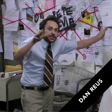
13–Julian Scadden – From Blue Collar Roots to Transforming Trades Leadership
In this episode of The Unfolding Thought Podcast, Julian Scadden, President and CEO of Nexstar Network, shares his incredible journey from humble beginnings to leading one of the most respected organizations in the trades industry. Julian talks about the personal and professional challenges he faced, how he overcame them, and his philosophy on leadership, growth, and community.
Julian also discusses the role of Nexstar Network in helping trades businesses thrive by providing top-tier training, mentorship, and operational support. From his own experiences as a business owner to his current role as a visionary leader, Julian offers actionable insights for anyone looking to grow their business, develop their team, or overcome obstacles with resilience and determination.
Tune in to hear Julian’s thoughts on the power of vision, responsibility, and mentorship in building a thriving business and a fulfilling career.
Mentioned in the Episode:
- The importance of mentorship and community in personal and professional growth.
- How Nexstar Network supports tradespeople in transitioning to business leadership.
- Lessons learned from scaling and running a trades business.
- Julian’s thoughts on vision and responsibility as tools for transformation.
Links:
- The 15 Commitments of Conscious Leadership: https://amzn.to/4gUats2
- Be Useful: https://amzn.to/4ap5XPV
- Discussion with Jeremy Nulik: Find episode 2 or https://unfoldingthought.com/jeremy-nulik-how-vision-shapes-strategy/
Connect with Julian Scadden:
- LinkedIn: https://www.linkedin.com/in/julianscadden/
- Nexstar Network: https://www.nexstarnetwork.com
Join the Conversation:
Have thoughts about this episode? Share them with us on social media, by leaving a review, emailing Eric at Eric@inboundandagile.com, or visiting the website at https://unfoldingthought.com.



















